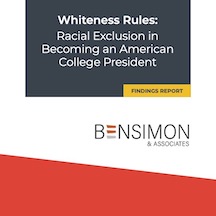 A new report prepared by Bensimons & Associates for the California Futures Foundation finds that whiteness “is embedded at every stage of presidential search and selection processes. While the preference for white (usually male) candidates is troubling, it is not surprising. What is distressing — and perverse — is the many ways in which whiteness forces Black, Latinx, Asian American, Native American, and Pacific Islander candidates to adapt to, as one president put it, the “mannerisms” that conform to white expectations, in order to make whites feel comfortable.”
A new report prepared by Bensimons & Associates for the California Futures Foundation finds that whiteness “is embedded at every stage of presidential search and selection processes. While the preference for white (usually male) candidates is troubling, it is not surprising. What is distressing — and perverse — is the many ways in which whiteness forces Black, Latinx, Asian American, Native American, and Pacific Islander candidates to adapt to, as one president put it, the “mannerisms” that conform to white expectations, in order to make whites feel comfortable.”
The report states that “While the majority of students in California’s public higher education system are Latinx, Asian American & Pacific Islander, and Black, the racial-ethnic and gender makeup of the presidents of these colleges and universities are much the same as in the 1970s: almost exclusively white and male.”
Among the findings are:
- Candidates of color need to conform to the white archetype of presidential leadership to be deemed qualified and to be hired.
- Biased appraisals that adhere to white standards result in search committees and decision-makers judging candidates of color as a risky choice at best and ineligible at worst.
- Because of white supremacy, presidents and candidates of color must live and work in a world where they are seen through white eyes and judged based on white expectations.
- Presidents of color attest to the benefits of having mentors and participating in executive leadership programs for navigating the hidden curriculum of presidential searches.
- The veiled nature of search committee meetings makes it possible for racialized (and gendered and ageist) messages to surface, despite the routine practice of implicit bias training.
- Executive search firms play an important supporting role in presidential searches, particularly when it comes to building the candidate pool and facilitating the logistical details of this complex process.
- Many announcements fail to meaningfully address racial equity, which may negatively impact applicant behavior and misrepresent the institution’s stance and current progress toward racial equity.
- Boards of trustees are the ultimate decision-makers, and determine who will become the next president of an institution. Beyond selection, boards can signal whether and in what ways racial equity should be a priority.
The full report, Whiteness Rules: Racial Exclusion in Becoming an American College President, may be downloaded here.











